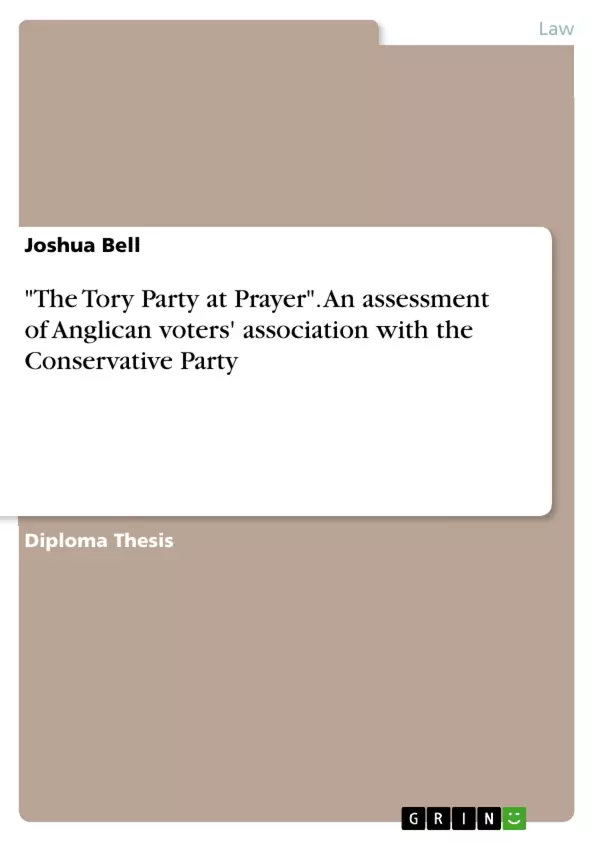The aim of this study is to identify the reasons behind Anglican voters’ association with the
Conservative Party. In the first section, the study will assess the relevant data taken from
‘Voting and Values in Britain: Does religion count?’ by researchers at Theos Think Tank. The
research supports the assumption that Anglicans are more likely to vote Conservative than
any other political party.
Having distinguished the facts, the second section of the study will establish the reasoning
behind this relationship. Here, the thesis will draw upon a number of sources in order to
explain the association.
It was concluded that Anglican voters’ association with the Conservative Party is largely a
response to the historical relationship between the two. It was further concluded that much
of the reasoning behind Anglican voters’ preference may be down to their values regarding
key moral issues. Areas for further research are also suggested within this study.
Inhaltsverzeichnis (Table of Contents)
- Introduction
- Literature review
- Data Analysis and Methodological Considerations
- The Conservative Party - its influence on Anglican voters
- The Church of England - a political influence on its members?
- The Future for Anglican Voters - where will their allegiance be?
- Conclusion
Zielsetzung und Themenschwerpunkte (Objectives and Key Themes)
This study aims to identify the reasons behind Anglican voters' association with the Conservative Party. It analyzes data from the Theos Think Tank's "Voting and Values in Britain: Does religion count?" to establish the prevalence of this association. The study then explores the historical and value-based factors contributing to this relationship.
- The relationship between Anglican voters and the Conservative Party
- Historical factors influencing this association
- Moral values and their influence on voting preferences
- The role of the Church of England in shaping political views
- Potential future trends in Anglican voting patterns
Zusammenfassung der Kapitel (Chapter Summaries)
The introduction sets the stage for the study, outlining its objective and research methodology. It provides an overview of the Theos Think Tank data and highlights the significance of Anglican voters' association with the Conservative Party.
The literature review delves into existing research and theoretical frameworks relevant to understanding the relationship between religion and political behavior. It explores concepts like religious voting, party affiliation, and the historical context of Anglicanism in British politics.
The "Data Analysis and Methodological Considerations" chapter provides a detailed examination of the research methodology employed in the study. It discusses the data sources, sampling methods, and statistical analysis used to analyze the relationship between Anglican voters and the Conservative Party.
The chapter "The Conservative Party - its influence on Anglican voters" explores the specific factors that contribute to the Conservative Party's appeal among Anglican voters. It examines historical connections, shared values, and the party's policies on issues important to Anglican voters.
The chapter "The Church of England - a political influence on its members?" investigates the role of the Church of England in shaping the political views of its members. It considers the Church's official stance on various political issues, the influence of religious leaders, and the impact of congregational values on voting preferences.
The chapter "The Future for Anglican Voters - where will their allegiance be?" analyzes potential future trends in Anglican voting patterns. It considers factors such as demographic shifts, changing social values, and the evolving landscape of British politics.
Schlüsselwörter (Keywords)
This dissertation focuses on the relationship between Anglican voters and the Conservative Party in Britain. Key themes explored include religious voting, political party affiliation, historical connections, shared values, moral issues, the Church of England, and future trends in voting behavior.
Frequently Asked Questions
Why do Anglican voters often support the Conservative Party?
The association is largely rooted in a long historical relationship between the Church of England and the state, as well as shared values regarding key moral and social issues.
What is meant by the phrase "The Tory Party at Prayer"?
This historical phrase describes the close traditional and cultural link between the Church of England (Anglicanism) and the Conservative (Tory) Party in British politics.
Does religion still influence voting behavior in Britain?
Yes, research from the Theos Think Tank suggests that religious affiliation remains a significant indicator of voting patterns, with Anglicans being more likely to vote Conservative than for other parties.
How does the Church of England influence its members' political views?
The influence comes through official stances on political issues, the guidance of religious leaders, and the shared moral framework of the congregation.
What are the future trends for Anglican voters?
Future allegiance may shift due to demographic changes, evolving social values, and the changing landscape of British political parties, which the study explores in its concluding chapters.
- Quote paper
- Joshua Bell (Author), 2014, "The Tory Party at Prayer". An assessment of Anglican voters' association with the Conservative Party, Munich, GRIN Verlag, https://www.grin.com/document/281978



